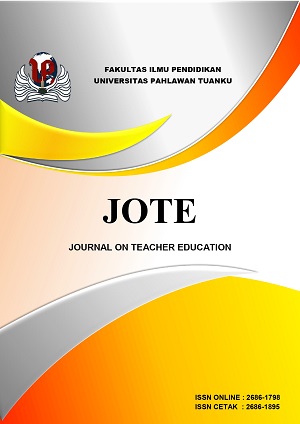Pemberdayaan Masyarakat melalui Perubahan Mindset Masyarakat Humbahas Menuju Tercapainya Ekowisata
Abstract
Keywords
Full Text:
PDFReferences
BPS Provinsi Kalimantan Utara. (2022). Pertumbuhan Ekonomi Sumatera Utara Triwulan IV-2021. BPS Provinsi Sumatera Utara, 41, 16.
Badan Pusat Statistik Provinsi Sumatera Utara. Data Tingkat Penghunian Kamar Hotel, 2016-2020
Buckley, Ralf. (2003). Case Studies in Ecotourism. Cambridge: CABI.
Butcher, Jim. (2007). Ecotourism, NGOs, and Development: A Critical Analysis. New York: Routledge.
Chafid Fandeli. (1995). Pengertian Dan Konsep Dasar Ekowisata. Society, 1(1990), 16.
Chuang, Shu-Tzu. (2010). Rural Tourism: Perspective from Social Exchange Theory. Social Behavior and Personality Journal. Volume 38, Nomor 10, Halaman 1313. Taiwan: Society for Personality Research (Inc.).
Departemen Kebudayaan dan Pariwisata dan WWF-Indonesia. (2009). Prinsip dan Kriteria Ekowisata Berbasis Masyarakat,
Dinas Kebudayaan dan Pariwisata Propinsi DIY. (2015). Buku Statisitik Pariwisata Daerah Istimewa Yogyakarta tahun 2015. Penerbit Dinas Kebudayaan dan Pariwisata Propinsi DIY.
Ecotourism and Environmental Sustainability: Principles and Practice. Burlington: Ashgate.
Fennell, David A. (2003). Ecotourism: An Introduction. Second Edition. New York: Routledge.Hill, Jennifer dan Gale, Tim (Eds.). (2009).
Hijriati, Emma, & Mardiana, R. (2014). Pengaruh Ekowisata Berbasis Masyarakat. Jurnal Sosiologi Pedesaan, 02(03), 146159.
Muliawan, H. (2000). Perencanaan dan Pengembangan Desa Wisata, Makalah disampaikan dalam Diklat bidang Pariwisata bagi Kepala Desa di Propinsi DIY, tg 14-16 Agustus 2000, di Hotel Phoenix, Yogyakarta
Muslim, Aziz. (2007). Pendekatan Partisipatif Dalam pemberdayaan Masyarakat; Aplikasia, Jurnal Aplikasi ilmu-ilmu Agama, Vol. VIII hal 89-103
Okazaki, Etsuko. (2008). A CommunityBased Tourism Model: Its Conception and Use. Journal of Sustainable Tourism. Vol 16, No. 5. Taylor & Francis, New York.
Phillips, Rhonda dan Pittman, Robert H. (Eds.). (2009). An Introduction to Community Development. New York: Routledge.
Ramadhan, M. A., Pratama, G. N. I. P., & Hidayah, R. (2018). Penataan Sistem Jalur Pejalan Kaki di Universitas Negeri Yogyakarta. INformasi dan Ekspose hasil Riset Teknik SIpil dan Arsitektur, 14(1), 101-117.
Satria, D. (2009). Strategi Pengembangan Ekowisata Berbasis Ekonomi Lokal Dalam Rangka Program Pengentasan Kemiskinan Di Wilayah Kabupaten Malang. Journal of Indonesian Applied Economics, 3(1), 12009. https://doi.org/10.21776/ub.jiae.2009.003.01.5
Sunaryo, Bambang. (2013) Kebijakan Pembangunan Destinasi Pariwisata Konsep dan Aplikasinya di Indonesia. Yogyakarta: Gava Media.
BPS Provinsi Kalimantan Utara. (2022). Pertumbuhan Ekonomi Sumatera Utara Triwulan IV-2021. BPS Provinsi Sumatera Utara, 41, 16.
DOI: https://doi.org/10.31004/abdira.v2i4.197
Refbacks
- There are currently no refbacks.
Copyright (c) 2022 HAMDI HAMDI, SUKARDI SUKARDI, NANA DYKI DIRBAWANTO

This work is licensed under a Creative Commons Attribution-ShareAlike 4.0 International License.





1.png)
